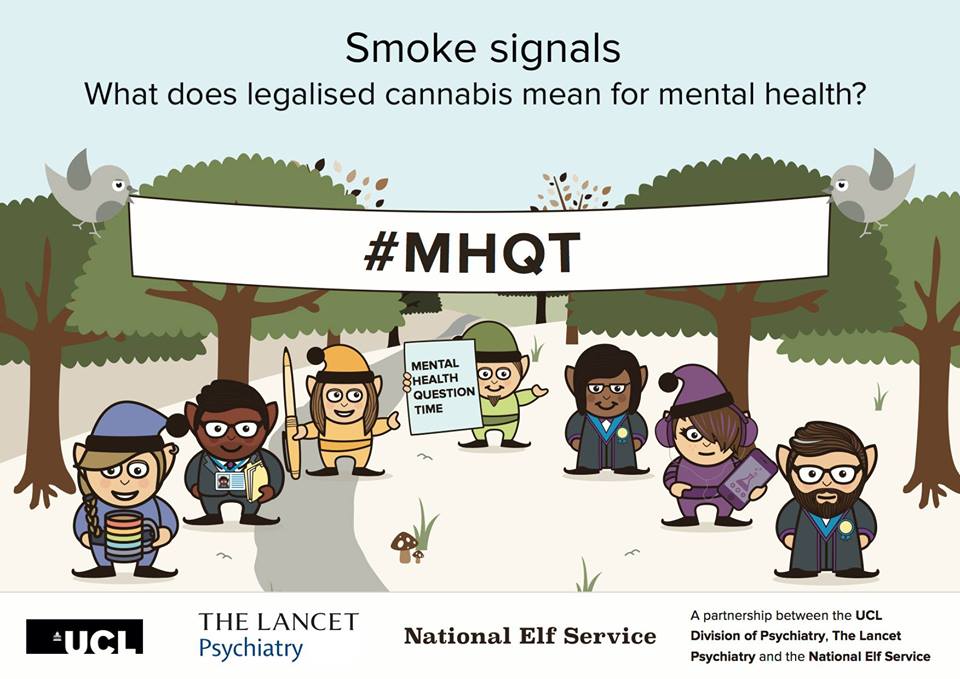Research into cannabis in Britain is systematically held back by the state and the vast majority of it focuses on whether or not it is harmful, while the framing of such research is so broad as to render it meaningless.
At a recent event discussing cannabis, Mental Health Question Time – a series of regular free to attend public discussions that take place in London, set up by the UCL Division of Psychiatry, The Lancet Psychiatry and the National Elf Service – Prof Val Curran, Professor of Psychopharmacology at UCL, explained that only a fraction of UK research into cannabis has been done into its ability to provide pleasure and only slightly more into whether it has medicinal qualities.
This dearth of research is due to cannabis being classified as a schedule 1 drug, making it illegal. If it were moved into schedule 2 a lot more research could be carried out – but the recent rescheduling by the Home Office only moves some ‘cannabis-derived’ medicines into schedule two, not cannabis per se.
The problems don’t end there. Research on participants never goes much further than the question “have you ever consumed cannabis?”. Little in the way of biological verification or measurement systems are included.
As Dr Marta Di Forti, a psychiatrist in London, pointed out: “No liver physician would ask the question ‘have you ever used alcohol yes or no?’ – they would not consider this a sensible question to estimate your current or future risk of developing liver disease. But the majority of cannabis research has been done using the question ‘have you ever used cannabis yes or no’?
“We know that aspirin, the most prescribed drug in the world, can have side effects, and we have regulations that it shouldn’t be used by children. But we still prescribe it. We know these things because the required studies have been done. There are different types of cannabinoid (CBD) compounds that need to be researched.”
Curran said that evidence pointed to cannabidiol – the most common strain of CBD used in medicines – having a direct mental health benefits. “Small scale but hopeful” trials have shown that cannabidiol can have beneficial effects on schizophrenia without the impact on weight that is common from other treatments. She also said cannabidiol can also help with dependence to cigarettes and cannabis itself.
She then argued that cannabis can have “indirect” mental health benefits in terms of alleviating acute and chronic pain in ways that a lot of opiates do not, in turn helping mental health and sleep. “It is surely a human right to have access to cannabis legally for that pain.”
Because global warming was making it harder to grow crops in southern Italy, hemp has been legalised, as it requires less water to grow. “They are now growing hemp pasta and hemp ricotta, they’re no longer unemployed, they’re much happier. So that’s another mental health benefit” – a slightly cheeky joke but also a salient point well made.
Curran said likened the cannabidiol – “a benign compound with very, very few side effects” – that you can access in Holland & Barrett to a placebo because it is only 5% in strength.
Attending the event, UKCSC chairman Greg De Hoedt asked the panel if it supported the UKCSC model. Curren said: “There are a lot of cannabis clubs in Spain and they are very productive because they are working with researchers.”
Dr Marta Di Forti, Psychiatrist, London replied: “Greg I would definitely prefer my young patients to go to you than the drug dealers in Brixton!”
She asked Greg if UKCSC members were comfortable telling each other if they were becoming too dependent on cannabis or having other problems with it and could support them and refer them to services, or whether there was a culture of having to protect the image of cannabis.
“Absolutely we try and get them the help they need if we they look like they need it,” said Greg. “We might tell someone they smoke with way too much tobacco in your spliff, you need to use the NHS stop smoking service, or ‘you don’t seem to be very happy at the moment, you’re using a lot of cannabis, do you want to speak to someone’. Members like speaking to us, they trust us, they know who they are.
“[As seen from the panel’s presentation] some people will smoke really strong cannabis and be completely fine with it, but some people can have one joint and it will ruin their week.”
Follow the UKCSC on social media: Facebook – Instagram – Twitter – Reddit




